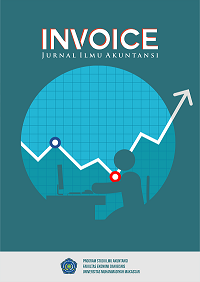SISTEM INFORMASI AKUNTANSI ATAS PENAGIHAN DALAM MENUNJANG KEEFEKTIFAN PENERIMAAN KAS PADA PT. FADEL PELUMAS INDONESIA
DOI:
https://doi.org/10.26618/inv.v1i2.2520Abstract
Penelitian ini bertujuan Untuk mengetahui system informasi akuntansi atas penagihan piutang dalam menunjang keefektifan penerimaan kas pada PT. Fadel Pelumas Indonesia. Penelitian ini menggunakan analisis data deskriptif kualitatif. Penelitian dilakukan di PT. Fadel Pelumas Indonesia. Hasil penelitian . PT. Fadel Pelumas Indonesia telah menerapkan sistem informasi akuntansi dengan tepat dalam proses penjualan dan penagihan piutang. Metode dan tekhnologi informasi yang digunakan sangat mendukung keefektifan dalam penerimaan kas. Sistem pengendalian intern cukup memadai dalam operasional kegiatan perusahaan.
This study aims to determine the accounting information system for collection of accounts receivable in supporting the effectiveness of cash receipts at PT. Fadel Indonesian Lubricants. This study uses qualitative descriptive data analysis. The research was conducted at PT. Fadel Indonesian Lubricants. Research result. PT. Fadel Pelumas Indonesia has implemented an accounting information system appropriately in the process of selling and collecting receivables. The methods and information technology used strongly support the effectiveness of cash receiptsReferences
Arens dan Loebbecke. (2017). Auditing. Jakarta. Salemba.
Dewi Anggadini, Sri dan Ely Suhayati. (2009). Akuntansi Keuangan. Bandung. Graha Ilmu.
Dewi, Septiana. 2005. Sistem Akuntansi Penerimaan Kas (Studi Kasus pada PT. Hendrawan, Cecilia. 2011. Analisis Penerapan Sistem Informasi Akuntansi Penjualan Kredit dan Peneriman Kas dalam Menunjang Efektivitas Penerimaan Kas dari Piutang. Bandung. Universitas Kristes Maranatha.
Husein, Umar. 2007. Metode Penelitian Untuk Skripsi Dan Tesis Bisnis. Jakarta: PT. Raja Grafindo Persada
Jogiyanto. 2005. Analisis dan Desain Sistem Informasi. Yogyakarta: Penerbit Andi.
Kurniawan, Irfan. 2003. Peranan Sistem Informasi Akuntansi dalam Menunjang Efektivitas Pengendalian Internal Penjualan Kredit (Studi Kasus pada PT. TRS di Bandung), Universitas Widyatama.
Midjan L. dan Azhar Susanto. (2017). Sistem Informasi Akuntansi. Edisi kedelapan, Cetakan pertama, Lingga Jaya, Bandung.
Mulyadi. 2014. Sistem Akuntansi. Edisi 3. Salemba Empat, Jakarta. PT. Raja Grafindo Persada.
Putra, Rizta. 2010. Analisis Penerapan Sistem Informasi Akuntansi Piutang Dagang dalam Meningkatkan Efektivitas Penerimaan Kas. Bandung. Universitas Kristen Maranatha.
Setiawan, Siska. 2009. Sistem Informasi Akuntansi Penagihan dan Piutang dalam Meningkatkan Efektivitas Penerimaan Kas Perusahaan. Bandung. Universitas Kristen Maranatha.
Sugiri, Slamet. 2009. Akuntansi Pengantar 2. Yogyakarta : UPP STIM YKPN.
Susanto, Azhar dan La Midjan, (2013), Sistem Informasi Akuntansi II, edisi kedelapan: Penerbit Lingga Jaya.
Widjajanto, Nugroho. 2001. Sistem Informasi Akuntansi. Salemba Empat, Jakarta.
Yusuf, Haryono, (2011). Dasar-Dasar Akuntansi. Jogjakarta. STIE YKPN.
Downloads
Published
Issue
Section
License
Authors who publish with Invoice: Jurnal Ilmu Akuntansi agree to the following terms:
Copyright Ownership
The copyright of all articles published in this journal remains with the author(s). However, the authors grant Invoice: Jurnal Ilmu Akuntansi the right of first publication with the work simultaneously licensed under a Creative Commons Attribution 4.0 International License (CC BY 4.0). This license allows others to share, copy, redistribute, adapt, and build upon the work for any purpose, even commercially, as long as proper credit is given to the original author(s) and the source.Licensing and Access
Invoice: Jurnal Ilmu Akuntansi provides immediate open access to its content on the principle that making research freely available to the public supports a greater global exchange of knowledge. All published materials are available freely without subscription or payment and can be accessed, downloaded, and reused by any user provided that appropriate attribution is given.Permission for Reuse
For uses not covered by the CC BY 4.0 license, such as commercial reprints, translations, or any form of adaptation without clear attribution, users must obtain written permission from the editorial team. Requests for such permissions can be directed to the editorial office at: [insert journal email here].Plagiarism and Originality
Authors are responsible for the originality of their submissions. All articles are screened for plagiarism using appropriate tools before acceptance. Manuscripts found to contain unoriginal content or infringing materials will be rejected or retracted as per journal policy.

